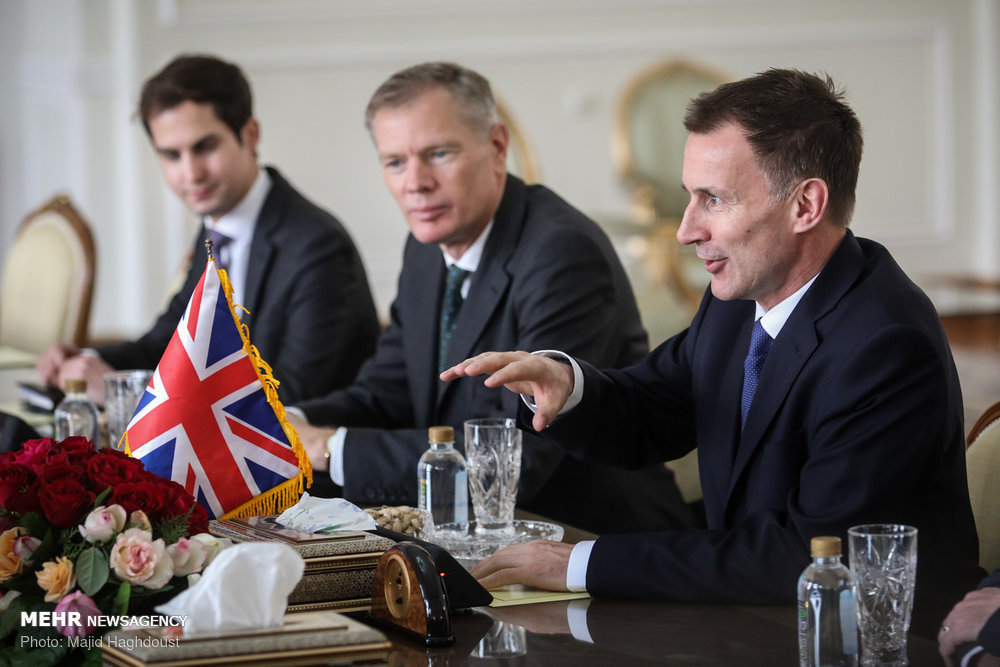By Mohammad Ghaderi

TEHRAN - Secretary of State for Foreign Affairs of the UK Jeremy Hunt, who came to Iran on Monday, in an interview described the Middle East as a tinderbox and warned against a First World War-style catastrophe in the Middle East.
Hunt said, “The Middle East is a tinderbox where one small event could lead to a catastrophe on the scale of the First World War. We have the issue of sanctions, we have a regional rivalry between Iran and Saudi Arabia which is getting more and more dangerous and has led to a proxy war. If we put all these together and look at the warning signs of WWI, we will see that small incidents like a chain of events can have big consequences with a catastrophic aftermath.”
He called the Zionist regime another important issue in the Middle East.
He also pointed to the arrest and imprisonment of two dual nationals in Iran and warned Tehran against such incidents and went on to claim that Britain remains one of the major players in the Middle East.
Britain’s hand in the Middle East crisis
Hunt’s warning about WWI and the importance of his country in the Middle East proves the role of Britain in the Middle East crisis.
Hunt’s referral to World War I could contain several messages for Tehran. One of the darker times in Iranian history occurred at the end of that war and the occupation of Iran by an alliance that brought about the Persian Great Famine of 1917–1919. About 2 million Iranians died of hunger and disease in that period while occupying armies were confiscating foodstuffs.
England’s hoarding of food aggravated the condition and caused the massive famine in Iran. Unfortunately, this part of Iran's history and the role that Britain played is not addressed and may be one of the reasons that the missionaries of London allow themselves to threaten Iran.
Hunt's words “First World War-style catastrophe in the Middle East” is also important at a time when Europe hypocritically talks about holding on to the JCPOA. First, given the British and Saudi partnership, Iran is threatened and finds itself in the heinous triangle of the West, the Zionists, and the Arabs. Secondly, it has put the Iranian people and government in a tough position with the unreasonable and aggressive demands and sanctions of the U.S. and Europe that could threaten another great famine. The BBC Persia has been on the mission to create a psychological war on the Iranians.
The threat of a global war in the Middle East comes at a time when Britain has recently begun to establish a military base in Oman and now pushed for the end of the Yemeni war.
Prior to his trip to Iran, Hunt had traveled to Saudi Arabia and discussed the necessity of ending the war in Yemen with Riyadh leaders.
Looking at Britain’s dirty laundry in the region, from the formation of the Zionist regime, to Pakistan and Afghanistan border disputes, the Iraq war, arms sales to terrorists in Syria and so on, all show that Britain has not stepped in to help end the suffering of the Yemeni people out of good will, but has another agenda in mind.
One can predict that if Britain’s’ plan to end the Yemen War comes to fruition, its influence in the region will expand.
In his recent trip to Riyadh, Hunt called Saudi Arabia Britain’s strategic partner and in his visit to Iran, he threatened Tehran with another war in the Middle East. Since earlier times, the British have been called ‘old foxes’ in Iran for being dishonest and cruel. However, it seems this time the Brits like Hunt are mistaken because Iran won’t bow down to intimidation and threats.

No comments:
Post a Comment